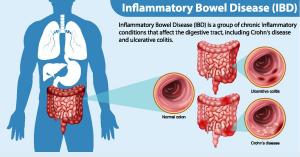IBD life expectancy is improving; with proper treatment and lifestyle support, many can lead long, healthy, and fulfilling lives.
PUNE, MAHARASHTRA, INDIA, September 13, 2025 /EINPresswire.com/ -- 𝐋𝐨𝐠𝐬𝐃𝐚𝐲, a leading source of wellness journalism, today published a new article titled “𝐂𝐚𝐧 𝐘𝐨𝐮 𝐋𝐢𝐯𝐞 𝐚 𝐅𝐮𝐥𝐥 𝐋𝐢𝐟𝐞 𝐰𝐢𝐭𝐡 𝐈𝐁𝐃? What Life Expectancy Looks Like” that offers encouraging findings for individuals diagnosed with inflammatory bowel disease (IBD), including Crohn’s disease and ulcerative colitis (UC). Recent research shows that life expectancy for many people with IBD is now close to normal—especially when disease is managed well, treatment is timely, and mental health is supported.
𝐊𝐞𝐲 𝐅𝐢𝐧𝐝𝐢𝐧𝐠𝐬
• Life expectancy has improved significantly over recent decades. The gap between people
with IBD and the general population has narrowed. Many patients today may expect a lifespan nearly identical to those without IBD.• Disease type influences risk, but outcomes are improving. Crohn’s disease tends to present with higher risks—strictures, fistulas, malnutrition—than ulcerative colitis. Ulcerative colitis carries its own long-term risks, including a higher risk of colon cancer. Yet both conditions now benefit from medical advances that reduce those risks.
• Advances in care are making a difference. Use of biologic therapies, early diagnosis, treatments that aim for deep remission, better surgery, and improved handling of complications and cancer surveillance are helping many with IBD lead long, healthy lives.
𝐖𝐡𝐲 𝐎𝐮𝐭𝐜𝐨𝐦𝐞𝐬 𝐀𝐫𝐞 𝐁𝐞𝐭𝐭𝐞𝐫
• 𝐌𝐨𝐝𝐞𝐫𝐧 𝐭𝐫𝐞𝐚𝐭𝐦𝐞𝐧𝐭𝐬 𝐚𝐧𝐝 𝐞𝐚𝐫𝐥𝐢𝐞𝐫 𝐝𝐢𝐚𝐠𝐧𝐨𝐬𝐢𝐬. New therapies—especially biologics—and care strategies that aim not just to suppress symptoms but to heal the gut lining have improved prognosis. Earlier detection means less irreversible damage over time.
• 𝐈𝐦𝐩𝐫𝐨𝐯𝐞𝐝 𝐦𝐞𝐝𝐢𝐜𝐚𝐥 𝐢𝐧𝐭𝐞𝐫𝐯𝐞𝐧𝐭𝐢𝐨𝐧𝐬. Surgical methods are safer now. Doctors also monitor patients more closely for complications and cancer, especially in ulcerative colitis. These practices help prevent serious outcomes.
• Lifestyle, comorbidities, and preventive health matter. Stop smoking, maintain a balanced diet, stay active, manage other health issues like diabetes or heart disease, get regular screenings, and keep vaccinations up to date. These decisions help support better long-term outcomes.
𝐖𝐡𝐢𝐥𝐞 𝐦𝐚𝐧𝐲 𝐰𝐢𝐭𝐡 𝐈𝐁𝐃 𝐝𝐨 𝐰𝐞𝐥𝐥, 𝐜𝐞𝐫𝐭𝐚𝐢𝐧 𝐟𝐚𝐜𝐭𝐨𝐫𝐬 𝐬𝐭𝐢𝐥𝐥 𝐢𝐧𝐟𝐥𝐮𝐞𝐧𝐜𝐞 𝐡𝐨𝐰 𝐟𝐮𝐥𝐥 𝐚𝐧𝐝 𝐡𝐞𝐚𝐥𝐭𝐡𝐲 𝐥𝐢𝐟𝐞 𝐜𝐚𝐧 𝐛𝐞:
• Age at diagnosis—being diagnosed young vs older affects how disease progresses.
• Disease severity and complications—frequent flare-ups, nutritional issues, or serious disease course add risk.
• Adherence to treatment—skipping medications or appointments raises risk. Regular care is crucial.
• Mental health and quality of life—pain, anxiety, or depression can reduce how much of life feels well lived, even when life span is preserved.
𝗟𝗶𝘃𝗶𝗻𝗴 𝗪𝗲𝗹𝗹 𝘄𝗶𝘁𝗵 𝗜𝗕𝗗
𝐋𝐨𝐠𝐬𝐃𝐚𝐲 𝐨𝐟𝐟𝐞𝐫𝐬 𝐚 𝐬𝐞𝐭 𝐨𝐟 𝐩𝐫𝐚𝐜𝐭𝐢𝐜𝐚𝐥 𝐭𝐢𝐩𝐬 𝐟𝐨𝐫 𝐢𝐧𝐝𝐢𝐯𝐢𝐝𝐮𝐚𝐥𝐬 𝐰𝐢𝐭𝐡 𝐈𝐁𝐃 𝐭𝐨 𝐦𝐚𝐱𝐢𝐦𝐢𝐳𝐞 𝐛𝐨𝐭𝐡 𝐥𝐨𝐧𝐠𝐞𝐯𝐢𝐭𝐲 𝐚𝐧𝐝 𝐪𝐮𝐚𝐥𝐢𝐭𝐲 𝐨𝐟 𝐥𝐢𝐟𝐞:
• 𝐌𝐞𝐝𝐢𝐜𝐚𝐥 𝐜𝐡𝐞𝐜𝐤𝐥𝐢𝐬𝐭: Stay connected with your gastroenterologist; follow treatment plans; keep vaccinations and cancer screenings up to date.
• 𝐋𝐢𝐟𝐞𝐬𝐭𝐲𝐥𝐞 𝐜𝐡𝐞𝐜𝐤𝐥𝐢𝐬𝐭: Avoid smoking; eat balanced meals while avoiding known trigger foods; stay physically active; support mental health through counseling, support groups or stress‐management techniques.
• 𝐖𝐡𝐞𝐧 𝐭𝐨 𝐬𝐞𝐞𝐤 𝐡𝐞𝐥𝐩: Be alert for signs that require medical attention, such as blood in stool, severe pain, unexplained weight loss, or prolonged fever. Early intervention matters.
𝐄𝐱𝐩𝐞𝐫𝐭 𝐏𝐞𝐫𝐬𝐩𝐞𝐜𝐭𝐢𝐯𝐞𝐬
“𝑳𝒊𝒇𝒆 𝒆𝒙𝒑𝒆𝒄𝒕𝒂𝒏𝒄𝒚 𝒉𝒂𝒔 𝒊𝒏𝒄𝒓𝒆𝒂𝒔𝒆𝒅 𝒊𝒏 𝒑𝒆𝒐𝒑𝒍𝒆 𝒘𝒊𝒕𝒉 𝑰𝑩𝑫,” says Dr. Eric I. Benchimol, pediatric gastroenterologist at SickKids, Toronto. He notes, however, there remains a gap between those with IBD and the general population.
Dr. Ellen M. Kuenzig, lead author of one of the key life expectancy studies, adds: “𝑷𝒂𝒊𝒏, 𝒅𝒆𝒑𝒓𝒆𝒔𝒔𝒊𝒐𝒏, 𝒂𝒏𝒙𝒊𝒆𝒕𝒚—𝒕𝒉𝒆𝒔𝒆 𝒂𝒇𝒇𝒆𝒄𝒕 𝒒𝒖𝒂𝒍𝒊𝒕𝒚 𝒐𝒇 𝒍𝒊𝒇𝒆 𝒂𝒏𝒅 𝒓𝒆𝒅𝒖𝒄𝒆 𝒉𝒆𝒂𝒍𝒕𝒉-𝒂𝒅𝒋𝒖𝒔𝒕𝒆𝒅 𝒍𝒊𝒇𝒆 𝒆𝒙𝒑𝒆𝒄𝒕𝒂𝒏𝒄𝒚. 𝑾𝒆 𝒏𝒆𝒆𝒅 𝒃𝒆𝒕𝒕𝒆𝒓 𝒔𝒕𝒓𝒂𝒕𝒆𝒈𝒊𝒆𝒔 𝒇𝒐𝒓 𝒎𝒂𝒏𝒂𝒈𝒊𝒏𝒈 𝒕𝒉𝒆𝒔𝒆.”
𝐁𝐨𝐭𝐭𝐨𝐦 𝐋𝐢𝐧𝐞
For individuals with IBD, the outlook has never been better. With improved treatments, lifestyle support, earlier care, and ongoing monitoring, many people with Crohn’s disease or ulcerative colitis can expect long, fulfilling lives. Advances in medical research continue to give patients more options for managing symptoms and preventing complications. IBD is a lifelong condition with no cure, but it doesn’t have to stop someone from living their dreams or enjoying a long life.
𝐀𝐛𝐨𝐮𝐭 𝐋𝐨𝐠𝐬𝐃𝐚𝐲
LogsDay is an online platform committed to wellness, lifestyle, and personal development. We publish evidence-based articles in simple language to help readers make informed decisions about their health, happiness, and wellbeing.
To read the full article, visit LogsDay.com.

No comments:
Post a Comment